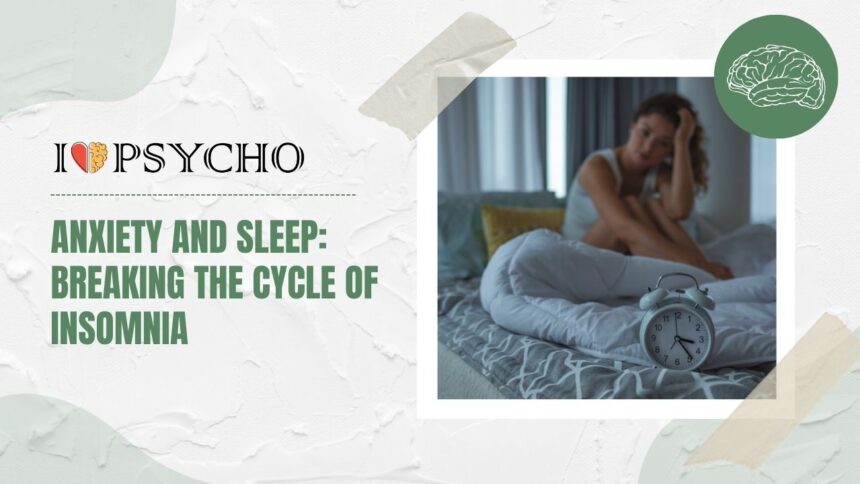Tossing and turning in bed, your mind racing with worries and what-ifs. Sound familiar? Anxiety can be a relentless companion, especially when it comes to getting a good night’s sleep. The vicious cycle of insomnia and anxiety is all too real for many people, impacting both mental health and overall well-being. But fear not! In this blog post, we will delve into the intricate relationship between anxiety and sleep, exploring strategies to break free from the grip of restlessness and reclaim peaceful nights. So grab a cozy blanket and let’s unravel the mysteries of overcoming insomnia through understanding anxiety.
What is Anxiety and How Does it Affect Sleep?
Anxiety is like a persistent shadow, lurking in the corners of our minds and hearts. It’s that feeling of unease, worry, or fear that can consume our thoughts and emotions. When anxiety creeps in, it can wreak havoc on our ability to relax and unwind, disrupting the delicate balance needed for restful sleep.
The mind becomes a whirlwind of racing thoughts, replaying past events or imagining future scenarios with dread. Our bodies tense up, unable to release the built-up tension from the day. As we lie awake at night, staring at the ceiling or tossing and turning in bed, sleep feels elusive.
The impact of anxiety on sleep is profound – it can lead to difficulty falling asleep, frequent awakenings throughout the night, or early morning risings. The quality of sleep suffers as a result; we wake up feeling exhausted rather than refreshed.
Understanding how anxiety affects sleep is crucial in finding ways to break free from this exhausting cycle. By addressing both mental health and sleep hygiene practices, we can work towards achieving a sense of peace and tranquility before bedtime.
The Vicious Cycle of Insomnia and Anxiety
Living with anxiety can feel like a constant battle, and when it comes to sleep, the struggle is real. Insomnia and anxiety often go hand in hand, creating a vicious cycle that can be difficult to break.
Anxiety keeps your mind racing at night, making it hard to relax and fall asleep. The lack of quality rest then exacerbates feelings of anxiousness during the day, leading to heightened stress levels and even more difficulty sleeping.
It’s like being caught in a never-ending loop where one issue feeds into the other, leaving you feeling drained both mentally and physically.
Breaking this cycle requires addressing both the underlying anxiety issues and implementing strategies to improve sleep quality. By finding ways to calm your mind before bed and establishing healthy sleep habits, you can start unraveling the intertwined web of insomnia and anxiety.
The Importance of Quality Sleep for Mental Health
Quality sleep is crucial for maintaining good mental health. When we don’t get enough rest, our cognitive functions can become impaired, leading to increased stress and anxiety levels. Lack of sleep can also exacerbate mood swings and make it harder to cope with everyday challenges.
During deep sleep stages, the brain processes emotions and consolidates memories, essential for emotional regulation and overall well-being. This is why a restful night’s sleep is often associated with feeling refreshed and emotionally stable the next day.
On the contrary, poor sleep quality has been linked to a higher risk of developing mental health disorders such as depression and anxiety. Chronic insomnia can further perpetuate these conditions, creating a cycle that is challenging to break without addressing underlying sleep issues.
Prioritizing healthy sleeping habits is not just about feeling less tired during the day; it directly impacts our ability to manage stress, process emotions effectively, and maintain optimal mental functioning. A consistent bedtime routine and creating a peaceful environment conducive to relaxation are key components in promoting quality sleep for better mental health.
Strategies to Improve Sleep and Reduce Anxiety
Struggling with anxiety-induced insomnia can feel overwhelming, but there are strategies you can incorporate into your routine to improve sleep quality and reduce stress levels.
Establishing a consistent bedtime routine can signal to your body that it’s time to wind down. This could include activities like reading a book, taking a warm bath, or practicing relaxation techniques such as deep breathing exercises.
Limiting screen time before bed is crucial as the blue light emitted from electronic devices can interfere with melatonin production. Instead of scrolling through social media or watching TV, opt for calming activities that promote relaxation.
Creating a comfortable sleep environment by keeping your bedroom dark, quiet, and cool can also contribute to better sleep. Investing in comfortable bedding and ensuring your mattress provides adequate support are small changes that can make a big difference.
Incorporating regular exercise into your daily routine has been shown to improve both sleep quality and reduce anxiety symptoms. Whether it’s going for a walk, practicing yoga, or hitting the gym – finding physical activities you enjoy can benefit both your mind and body.
Experimenting with mindfulness practices such as meditation or journaling before bed may help calm racing thoughts and promote feelings of peace and tranquility. Finding what works best for you is key in developing effective strategies to enhance sleep and manage anxiety levels effectively.
Professional Treatment Options for Chronic Insomnia and Anxiety
Struggling with chronic insomnia and anxiety can feel like an endless battle, impacting your daily life and overall well-being. When self-help strategies don’t provide relief, seeking professional treatment is crucial for breaking the cycle.
Consulting a healthcare provider or mental health professional can help determine the most effective treatment plan tailored to your specific needs. This may include medication, therapy, or a combination of both to address underlying causes and symptoms.
Cognitive Behavioral Therapy for Insomnia (CBT-I) is a widely recommended approach that focuses on changing behaviors and thoughts negatively affecting sleep. By learning new techniques to improve sleep hygiene and manage stress, individuals can experience significant improvements in their quality of rest.
In some cases, medication prescribed by a doctor may be necessary to alleviate severe symptoms of anxiety or insomnia. It’s important to work closely with healthcare professionals to monitor progress and make adjustments as needed for optimal results.
Personal Experiences and Success Stories
Personal experiences and success stories can provide hope and inspiration to those struggling with anxiety-induced insomnia. Hearing how others have overcome similar challenges can be a source of motivation for individuals feeling lost in the cycle of sleepless nights and anxious days.
One individual may share how implementing relaxation techniques before bed helped them calm their racing thoughts, leading to improved sleep quality. Another might talk about the positive impact exercise had on reducing their overall stress levels, resulting in a more restful night’s sleep.
These stories remind us that there is not a one-size-fits-all solution to managing anxiety and insomnia. Each person’s journey is unique, filled with ups and downs, setbacks, and breakthroughs.
By sharing personal experiences and success stories, we create a sense of community among those facing similar struggles. It fosters a supportive environment where individuals can learn from each other’s triumphs and setbacks as they navigate their own paths towards better sleep and mental well-being.
Common Triggers for Anxiety-Induced Insomnia
It’s no secret that anxiety can wreak havoc on our sleep patterns. The racing thoughts, the constant worrying, and the feeling of unease can make it nearly impossible to drift off into a peaceful slumber.
Common triggers for anxiety-induced insomnia vary from person to person but often include stress at work or school, relationship issues, financial concerns, and health worries. These triggers can create a vicious cycle where anxiety leads to poor sleep quality, which in turn exacerbates feelings of anxiety.
Additionally, lifestyle factors such as excessive screen time before bed, irregular sleep schedules, and consuming stimulants like caffeine late in the day can also contribute to insomnia caused by anxiety. It’s important to identify these triggers in order to address them effectively and break free from the cycle of sleepless nights.
By recognizing the common triggers for anxiety-induced insomnia in your own life, you can take steps towards improving your sleep hygiene and overall mental well-being.
Cognitive Behavioral Therapy for Insomnia (CBT-I)
Cognitive Behavioral Therapy for Insomnia (CBT-I) is a structured program that helps individuals identify and replace thoughts and behaviors that cause or worsen sleep problems. It focuses on changing habits and attitudes that disrupt sleep patterns, rather than relying on medication alone.
One of the key components of CBT-I is stimulus control therapy, which aims to associate the bed with sleep rather than activities like watching TV or working. This helps strengthen the connection between being in bed and falling asleep easily.
Another aspect of CBT-I is sleep restriction therapy, which involves limiting the time spent in bed to match actual time asleep. By gradually increasing this time, individuals can improve their ability to fall asleep quickly and stay asleep throughout the night.
Moreover, relaxation techniques such as deep breathing exercises or progressive muscle relaxation are often incorporated into CBT-I to help calm the mind and body before bedtime. These strategies can be powerful tools in breaking the cycle of anxiety-induced insomnia.
Natural Remedies for Sleep and Relaxation
Looking for natural ways to improve your sleep and relax your mind? Here are some effective remedies to help you unwind and achieve a peaceful night’s rest.
One popular option is aromatherapy, using essential oils like lavender or chamomile. Simply add a few drops to a diffuser or pillow before bedtime for a calming effect.
Another soothing method is drinking herbal teas such as valerian root or passionflower. These natural ingredients can help promote relaxation and ease anxiety before sleep.
Engaging in mindfulness practices like meditation or gentle yoga can also be beneficial in reducing stress levels and preparing the body for rest.
Creating a bedtime routine that includes turning off screens an hour before bed, dimming the lights, and reading a book can signal to your body that it’s time to wind down.
Experiment with different techniques to find what works best for you in promoting deep relaxation and improving your overall sleep quality.
Conclusion: Breaking the Cycle and Achieving Restful Sleep
In the journey to overcome anxiety-induced insomnia, it is crucial to remember that breaking the cycle requires patience, persistence, and a multifaceted approach. By understanding how anxiety impacts sleep and implementing strategies to improve both your mental health and sleep quality, you can begin to regain control over your well-being.
Remember that seeking professional treatment options such as therapy or medication for chronic insomnia and anxiety is not a sign of weakness but rather a proactive step towards healing. Personal experiences and success stories from others who have walked this path can provide hope and inspiration along the way.
Identifying common triggers for anxiety-induced insomnia allows you to address them head-on while exploring cognitive behavioral therapy for insomnia (CBT-I) can help reframe negative thought patterns surrounding sleep. Additionally, natural remedies like relaxation techniques or herbal supplements may complement your efforts in achieving restful sleep.
Breaking the cycle of insomnia and anxiety is within reach with dedication, support, and self-care practices. By prioritizing quality sleep and taking steps towards managing anxiety effectively, you pave the way towards a healthier mind-body connection. Remember, small changes add up over time – so be gentle with yourself on this transformative journey towards better sleep and overall well-being.









